Mark Trevelyan
Updated Wed, October 11, 2023 at 8:52 a.m. MDT·4 min read
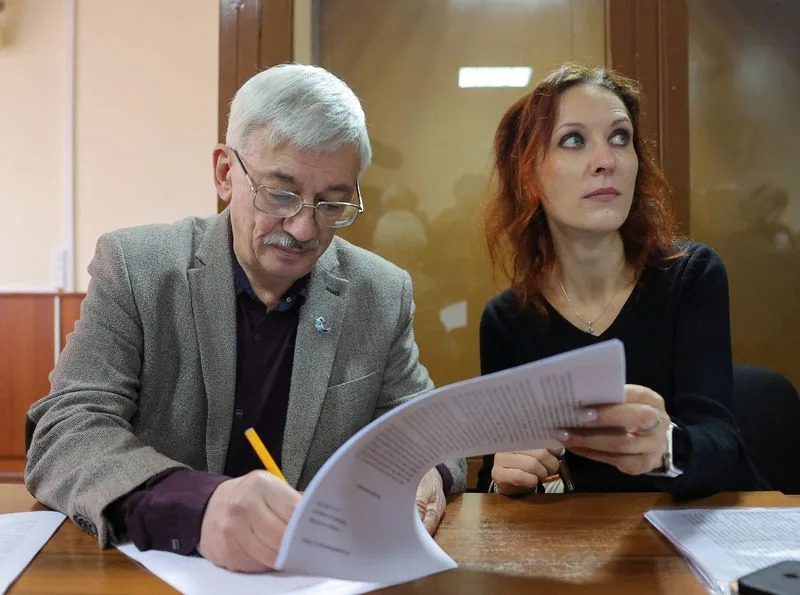
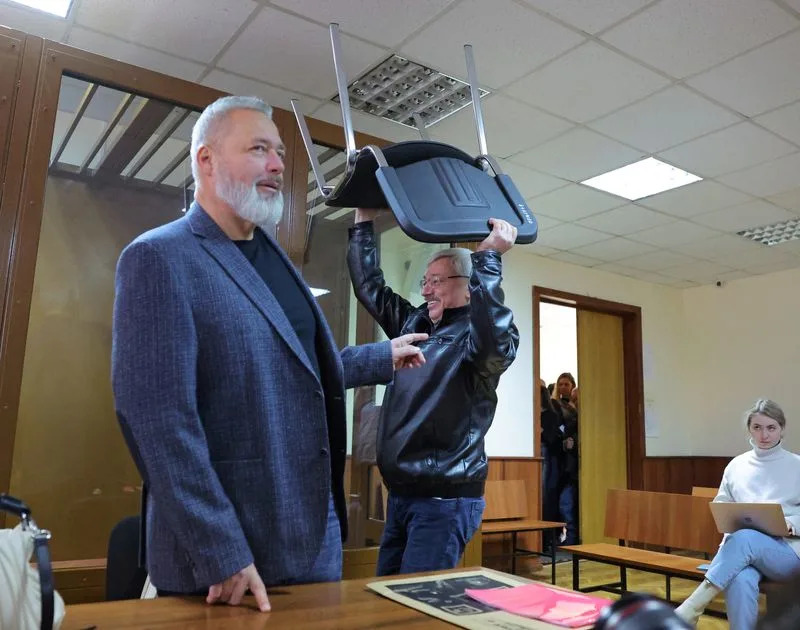
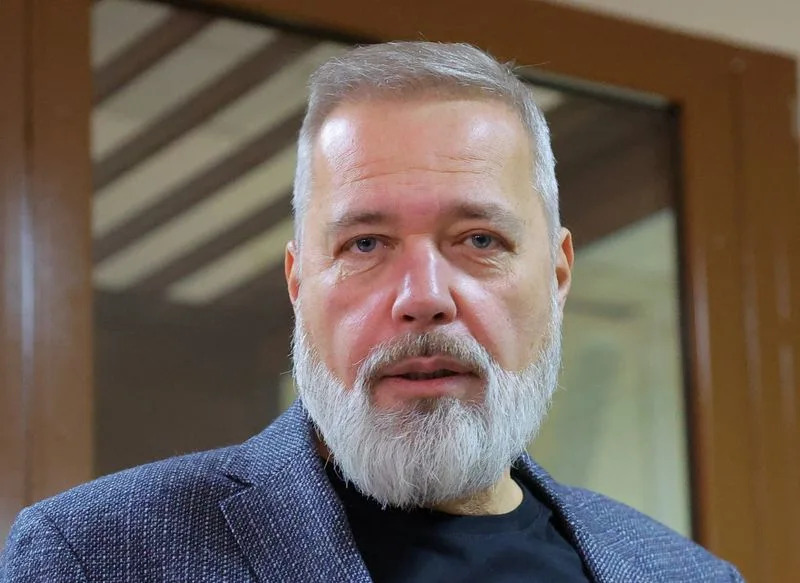
By Mark Trevelyan
LONDON (Reuters) -Veteran Russian rights activist Oleg Orlov was convicted and fined on Wednesday for "discrediting" the armed forces after telling a Moscow court that Russia had descended into a totalitarian state resembling George Orwell's "1984".
Orlov, 70, was defending himself in a case based on a November 2022 article in which he wrote that Russia under President Vladimir Putin had descended into fascism.
Far from repenting of that statement, he defiantly used his closing speech to declare that Russians were living in Orwell's dystopian world as their country waged war on its neighbour while claiming to support freedom, peace and security.
"There is still no concept of 'thought crime' in the Russian criminal code; citizens are not yet punished for doubting the correctness of state policy if it was expressed in a whisper in their own apartment; they are not punished for an incorrect facial expression. Yet," he said.
"But if someone expresses such doubt outside his apartment, denunciation and punishment may follow," said Orlov, a leading member of the Memorial human rights group that was disbanded by Russia in 2021 but won a share of the Nobel Peace Prize the following year.
He asked aloud how Russia had thrown off communism in the 1990s, only to "slide into a new totalitarianism".
Orlov was supported in court by Dmitry Muratov, co-winner of the Nobel prize in 2021, whose Novaya Gazeta newspaper was forced to shut down soon after Russia's invasion of Ukraine.
Muratov said that just as dissident Andrei Sakharov had predicted that the 1979 invasion of Afghanistan would lead the Soviet Union to disaster, so Orlov was justified in warning that Russia was following a path towards self-destruction in Ukraine.
'DARK FORCES'
"Why does the state take a tax on lives without asking the consent of its citizens? Shakes out their lives like grain from the peasants after the revolution?" Muratov said.
"We see that Sakharov was right, absolutely right back then, warning that the USSR would undermine its existence, and Orlov is right now, warning about the danger of dark, pro-fascist forces."
Orlov's and Muratov's lengthy statements to the court amounted to a devastating critique of Putin's decision to go to war in Ukraine from two of Russia's most internationally respected figures.
The Kremlin says its "special military operation" was justified by the need to protect Russian-speakers in Ukraine from "genocide" and to "demilitarise" and "denazify" the country - arguments rejected by Kyiv and its Western allies as a false pretext for an imperial-style war.
The prosecution in Orlov's case said the fact that the court hearing was open to the media, and that Muratov had been allowed to speak despite being designated a "foreign agent" by the state, showed that freedom of speech was protected in Russia.
But it said such rights were accompanied by obligations, including a duty to obey laws. It said it was impermissible to carry out "provocations aimed at splitting civil society".
Based on Orlov's age and state of health, however, the prosecution said it was seeking to have him fined, rather than asking for the prison sentence of up to three years that it could have sought under laws passed soon after Russia's invasion of Ukraine last year.
The judge ordered a fine of 150,000 roubles ($1,500), lower than the 250,000 roubles the prosecutors had demanded.
Orlov, in his speech, said Russians had the right under the constitution to hold a different opinion from Putin.
"Where is it defined that our commander-in-chief (Putin) always rightly understands not only the interests of Russia, but the interests of its citizens?" Orlov asked in his closing speech at a trial which began in June.
"And if the ideas of a part of Russia's citizens about their own interests don't match those of the commander-in-chief, don't they have the right to talk about this?"
"But in that case, the president is no longer a president, but a spiritual and secular leader... Or are Russia's top officials now infallible, like the Pope?"
(Editing by Gareth Jones and Jonathan Oatis)
Russian authorities fine a human rights advocate for criticizing the war in Ukraine
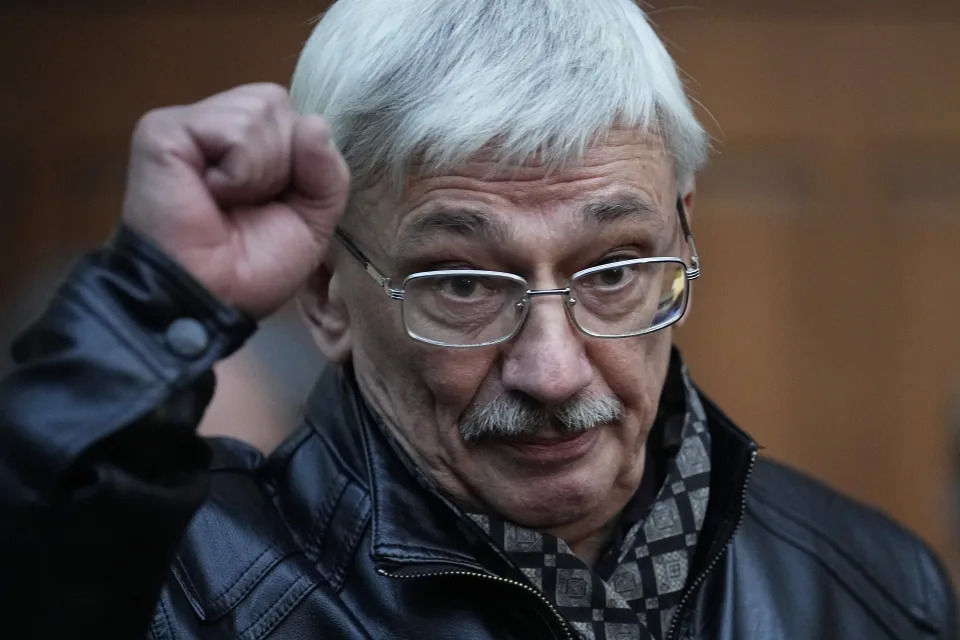
Russia Crackdown
Oleg Orlov, a member of the Board of the International Historical Educational Charitable and Human Rights Society 'Memorial' (International Memorial) gestures after a court session in Moscow, Russia, Wednesday, Oct. 11, 2023. The court ordered Orlov, co-chair of the Nobel Peace Prize-winning human rights group Memorial, to pay a fine of nearly $1,500 on the charges of "discrediting" the Russian military in his criticism of Russia's campaign in Ukraine. (AP Photo/Alexander Zemlianichenko)
\
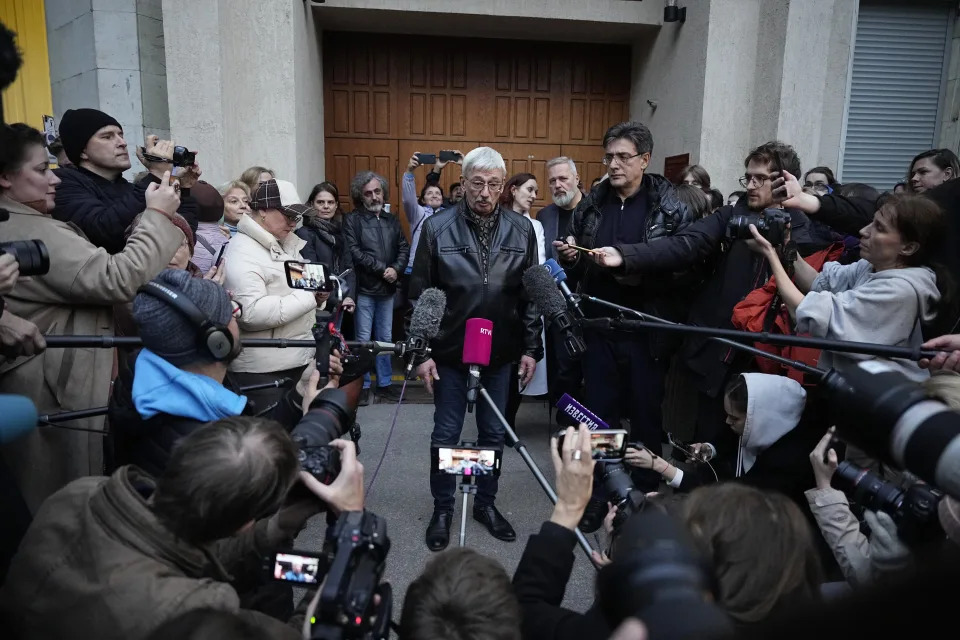
Oleg Orlov, a member of the Board of the International Historical Educational Charitable and Human Rights Society 'Memorial' (International Memorial) speaks to journalists after a court session in Moscow, Russia, Wednesday, Oct. 11, 2023. The court ordered Orlov, co-chair of the Nobel Peace Prize-winning human rights group Memorial, to pay a fine of nearly $1,500 on the charges of "discrediting" the Russian military in his criticism of Russia's campaign in Ukraine. (AP Photo/Alexander Zemlianichenko)
DASHA LITVINOVA
Updated Wed, October 11, 2023
TALLINN, Estonia (AP) — Human rights advocate Oleg Orlov was fined about $1,500 on Wednesday for criticizing the war in Ukraine, the latest step in a relentless crackdown on activists, independent journalists and opposition figures.
Orlov, co-chairman of the Nobel Peace Prize-winning human rights group Memorial, was convicted of publicly “discrediting” the Russian military after a Facebook post in which he denounced the invasion of Ukraine.
A law adopted shortly after the Kremlin sent troops across the border made it a criminal offense if committed repeatedly within a year; Orlov has been fined twice for antiwar protests before facing criminal charges.
A Moscow court began hearing the case in March, and Orlov faced up to five years in prison if convicted. In closing arguments Wednesday, however, the prosecution asked the court to impose a fine of 250,000 rubles (about $2,500).
“Thank God!” gasped Orlov's wife when she heard that in court, according to the Russian news outlet Mediazona.
Several hours later, the judge delivered the verdict and ordered Orlov to pay an even lower fine — 150,000 rubles (about $1,500).
Memorial, one of the oldest and the most renowned Russian rights organizations, was awarded the 2022 Nobel Peace Prize along with imprisoned Belarusian activist Ales Bialiatski and the Ukrainian organization Center for Civil Liberties.
Memorial was founded in the Soviet Union in 1987 to ensure that victims of Communist Party repression would be remembered. It has continued to compile information on human rights abuses and track the fate of political prisoners in Russia while facing a Kremlin crackdown in recent years.
The group had been declared a “foreign agent,” a designation that brings additional government scrutiny and carries strong pejorative connotations. Over the years, it was ordered to pay massive fines for alleged violations of the ”foreign agent” law.
Russia’s Supreme Court ordered it shut down in December 2021, a move that sparked an outcry at home and abroad.
Memorial and its supporters have called the trial against Orlov politically motivated. His defense team included Dmitry Muratov, editor-in-chief of the independent newspaper Novaya Gazeta and winner of the Nobel Peace Prize in 2021.
Addressing the court Wednesday, Orlov rejected the charges and stressed he does “not regret” speaking out against the war. He called the punishment the prosecution asked for “extremely lenient,” compared with long prison terms handed to other activists and opposition figures, and “a small price to pay for expressing a position I believe to be true.”
After the verdict was announced, he left the courtroom applauded by his supporters. Orlov promised to appeal the “soft, but unlawful and unjust” sentence and urged his supporters not to forget about political prisoners who have to spend years behind bars.
After invading Ukraine in February 2022, the Kremlin doubled down on suppressing dissent, adopting legislation effectively outlawing any criticism of what it insisted on calling its “special military operation.”
Since then, nearly 8,000 Russians have faced misdemeanor charges and over 700 people have been implicated in criminal cases for speaking out about or protesting the war, according to the OVD Info human rights and legal aid group.
The authorities have also used the new law to target opposition figures, human rights activists and independent media. Top critics have been sentenced to long prison terms, rights groups have been forced to shut down operations, independent news sites were blocked and independent journalists have left the country, fearing prosecution.
Many of those exiles have been tried, convicted and sentenced to prison terms in absentia. The scale of the crackdown has been unprecedented in post-Soviet Russia.
___
Follow AP's coverage of the war in Ukraine at https://apnews.com/hub/russia-ukraine
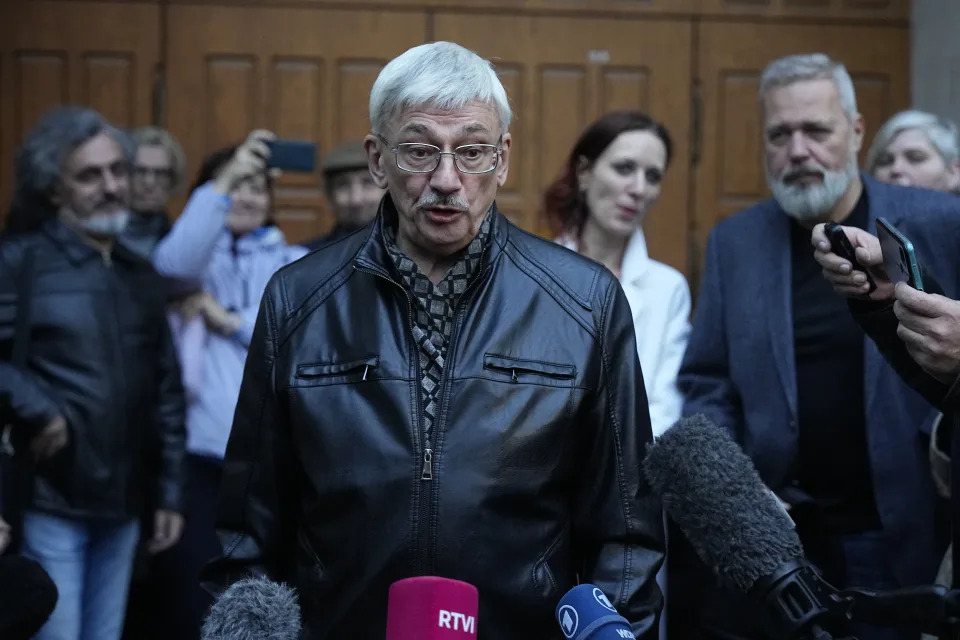
Oleg Orlov, a member of the Board of the International Historical Educational Charitable and Human Rights Society 'Memorial' (International Memorial) speaks to journalists after a court session in Moscow, Russia, Wednesday, Oct. 11, 2023. The court ordered Orlov, co-chair of the Nobel Peace Prize-winning human rights group Memorial, to pay a fine of nearly $1,500 on the charges of "discrediting" the Russian military in his criticism of Russia's campaign in Ukraine.
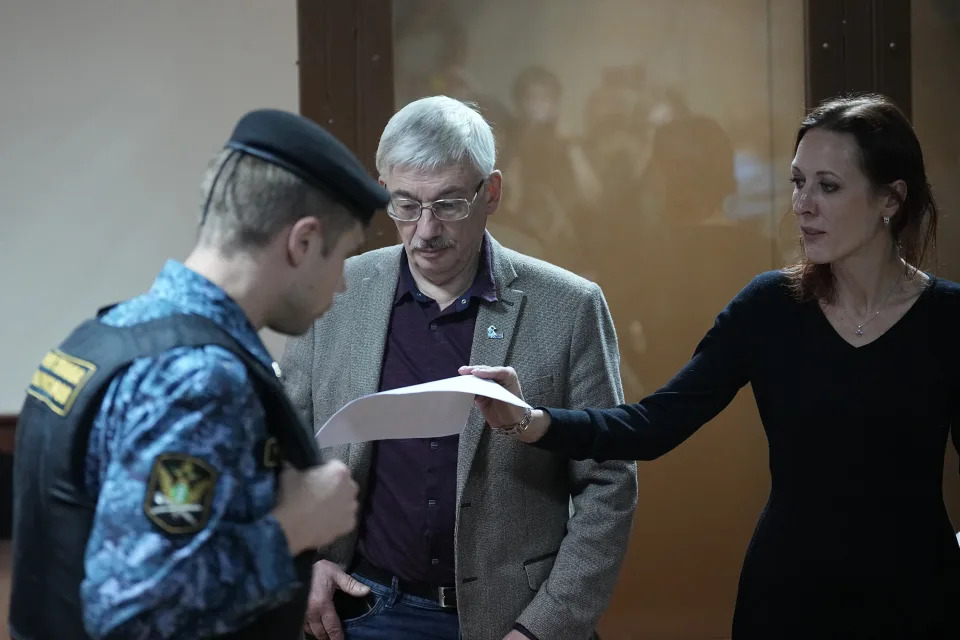
Oleg Orlov, a member of the Board of the International Historical Educational Charitable and Human Rights Society 'Memorial' (International Memorial), centre, looks on as his lawyer Yekaterina Tertukhina, right, holds a document after a court session in Moscow, Russia, Wednesday, Oct. 11, 2023. The court ordered Orlov, co-chair of the Nobel Peace Prize-winning human rights group Memorial, to pay a fine of nearly $1,500 on the charges of "discrediting" the Russian military in his criticism of Russia's campaign in Ukraine.
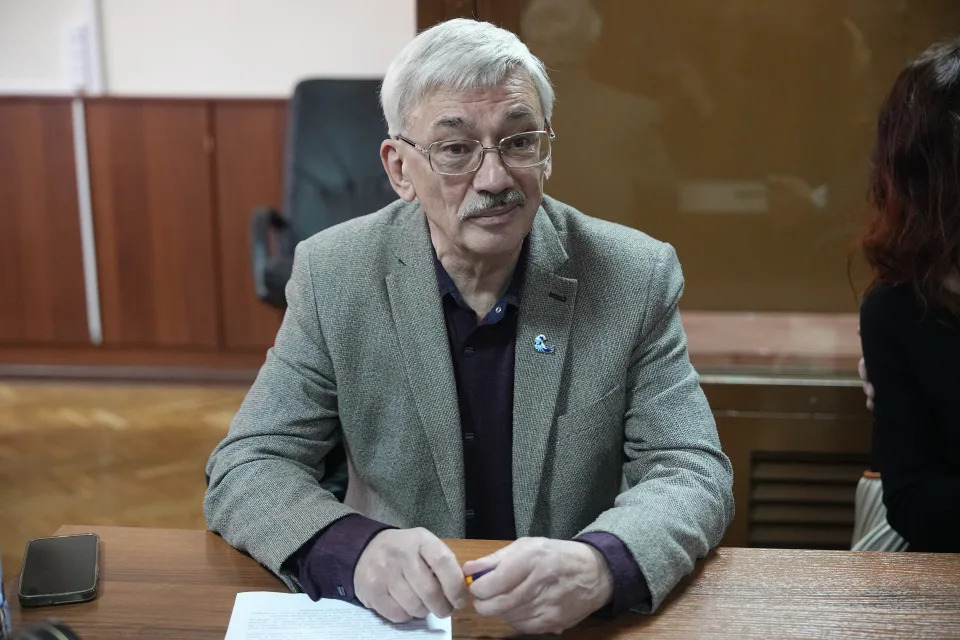
Oleg Orlov, a member of the Board of the International Historical Educational Charitable and Human Rights Society 'Memorial' (International Memorial) sits at a courtroom prior to a session in Moscow, Russia, Wednesday, Oct. 11, 2023. Orlov, the co-chair of the Nobel Peace Prize-winning human rights group Memorial, is on trial on charges of "discrediting" the Russian military in his criticism of Russia's campaign in Ukraine and could face up to five years in prison if convicted.
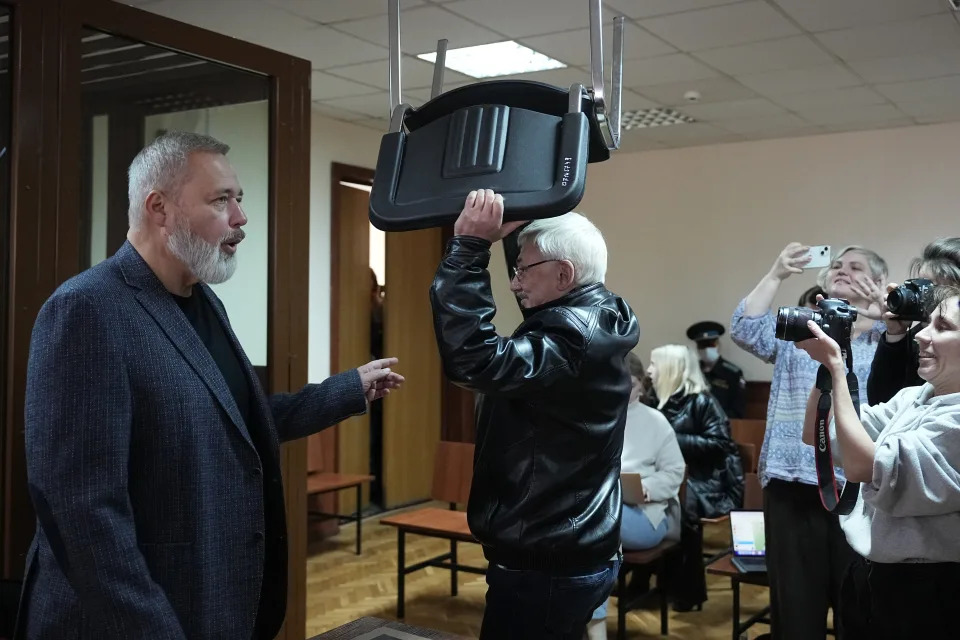
Oleg Orlov, a member of the Board of the International Historical Educational Charitable and Human Rights Society 'Memorial' (International Memorial), centre, carries a chair, as Nobel Peace Prize awarded journalist Dmitry Muratov, editor-in-chief of the influential Russian newspaper Novaya Gazeta, left, speaks to journalists at a courtroom prior to a session in Moscow, Russia, Wednesday, Oct. 11, 2023. Orlov, the co-chair of the Nobel Peace Prize-winning human rights group Memorial, is on trial on charges of "discrediting" the Russian military in his criticism of Russia's campaign in Ukraine and could face up to five years in prison if convicted.
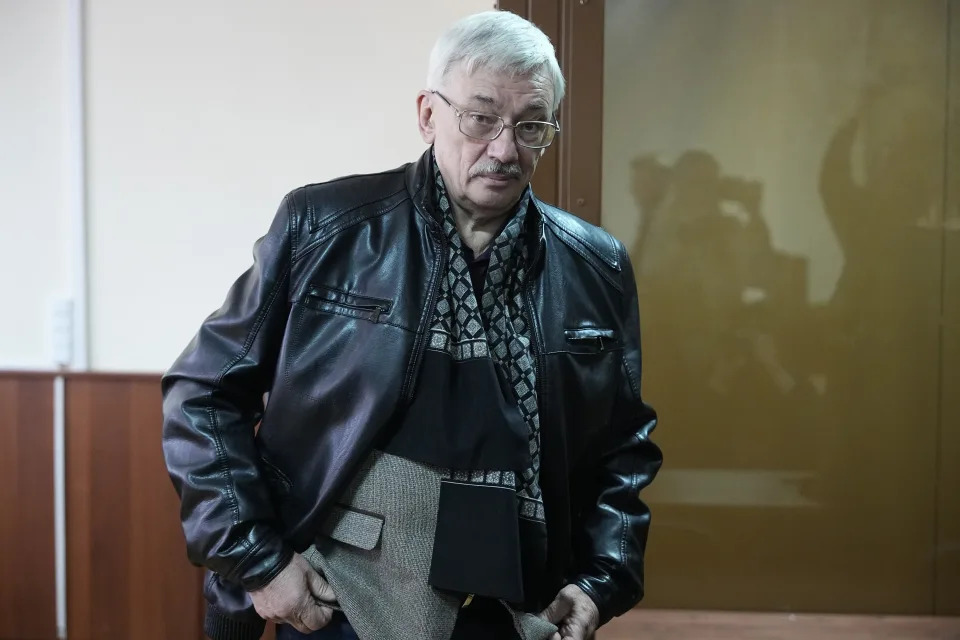
Oleg Orlov, a member of the Board of the International Historical Educational Charitable and Human Rights Society 'Memorial' (International Memorial) stands at a courtroom prior to a session in Moscow, Russia, Wednesday, Oct. 11, 2023. Orlov, the co-chair of the Nobel Peace Prize-winning human rights group Memorial, is on trial on charges of "discrediting" the Russian military in his criticism of Russia's campaign in Ukraine and could face up to five years in prison if convicted.
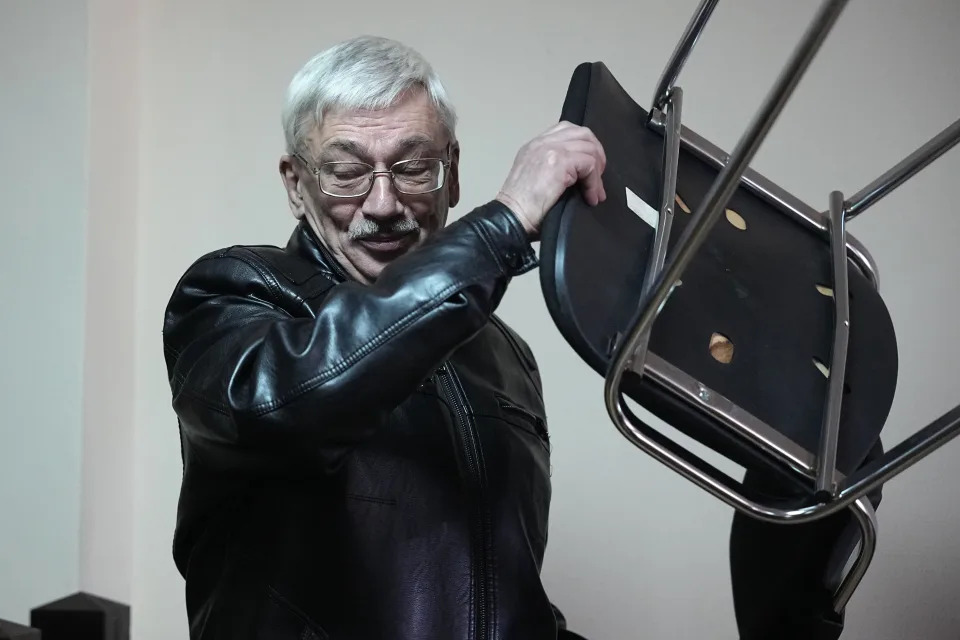
Oleg Orlov, a member of the Board of the International Historical Educational Charitable and Human Rights Society 'Memorial' (International Memorial) carries a chair at a courtroom prior to a session in Moscow, Russia, Wednesday, Oct. 11, 2023. Orlov, the co-chair of the Nobel Peace Prize-winning human rights group Memorial, is on trial on charges of "discrediting" the Russian military in his criticism of Russia's campaign in Ukraine and could face up to five years in prison if convicted.

Oleg Orlov, a member of the Board of the International Historical Educational Charitable and Human Rights Society 'Memorial' (International Memorial), left, and his lawyer Yekaterina Tertukhina speak to journalists at a courtroom prior to a session in Moscow, Russia, Wednesday, Oct. 11, 2023. Orlov, the co-chair of the Nobel Peace Prize-winning human rights group Memorial, is on trial on charges of "discrediting" the Russian military in his criticism of Russia's campaign in Ukraine and could face up to five years in prison if convicted.
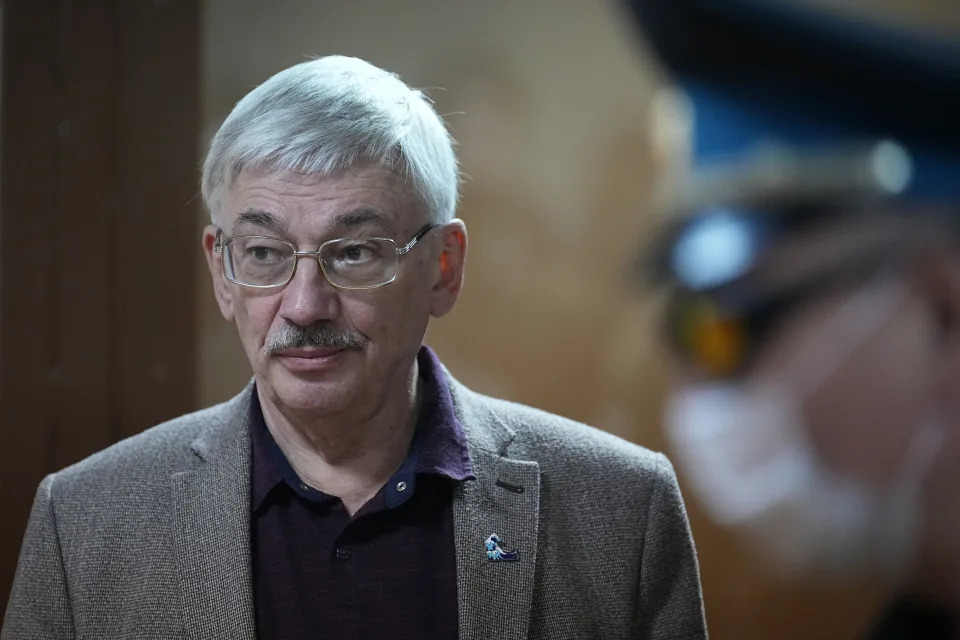
Oleg Orlov, a member of the Board of the International Historical Educational Charitable and Human Rights Society 'Memorial' (International Memorial) stands at a courtroom during a session in Moscow, Russia, Wednesday, Oct. 11, 2023. Orlov, the co-chair of the Nobel Peace Prize-winning human rights group Memorial, is on trial on charges of "discrediting" the Russian military in his criticism of Russia's campaign in Ukraine and could face up to five years in prison if convicted.
(AP Photo/Alexander Zemlianichenko)
No comments:
Post a Comment